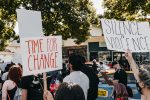It started on May 2, when word got out about a rumored leak from the Supreme Court. The document in question revealed that the Court was preparing to overturn its 1973 ruling in Roe v. Wade. This case forms the backbone of abortion rights in this country; its overturn would allow individual states to limit access to abortion to whatever degree they see fit.
In some states — 26, to be precise — this would mean either a total or near-total ban. For people with uteruses living in these states, the only way they could access a legal abortion would be to travel to a state that offers one.
Not everyone with a uterus can exercise this option, however. Some individuals would have to travel through many states to reach a jurisdiction where abortion is allowed; for people without access to reliable transportation and money for gas, this journey would be nearly impossible. There’s also the matter of missing work. Not everyone can skip days of work to travel to another state for a medical procedure — making this ruling especially discriminatory toward low-income individuals.
Beyond that, overturning Roe v. Wade would set a dangerous precedent. As Time Magazine explained, “Justice Alito’s draft opinion for the Court says that Roe was ‘egregiously wrong’ because it protects a right that was not included in the text of the Constitution, was not protected by the original meaning of the Constitution, and was not traditionally safeguarded as a constitutional right.”
The implications of this overturn are distressing. If this precedent were to be followed in other cases, the right to an abortion would not be the only civil liberty on the chopping block. Numerous Supreme Court cases, including Loving v. Virginia and Obergefell v. Hodges — which federally legalized interracial marriage and same-sex marriage respectively — hinge on this exact same premise.
As a woman named Elyse Green explained to The New York Times, the overturn of Roe v. Wade is nothing short of a threat to their freedom:
“As an African American woman, it feels like my whole existence is being attacked. Once you start taking apart things that give humans rights, what will stop them from bringing back the Jim Crow era? What will stop them from taking away rights that African Americans have worked so hard for?”
There is so much at stake here and the explosive public outcry is why it’s been deemed “the summer of rage.” In the days after the initial news leaked, floods of people took to the streets. Furious and terrified, long-time activists and everyday people joined protests across the country to stand up for their rights. This was not an entirely unexpected reaction to the leak; polling conducted just a mere week before the leak found that 61% of the country was opposed to overturning Roe v. Wade, which comes to well over 200 million people.
Though not all of those 200 million are taking to the streets in protest, people have still poured out into the public forum to take a stand. From Michigan to Texas to directly in front of the United States Supreme Court in Washington, D.C., people who want Roe v. Wade protected are making their voices heard.
One of those individuals is Amy Eshleman, the wife of Chicago mayor Lori Lightfoot. When she spoke at the rally held in Chicago following the leak, she echoed the message shared by many others: If Roe v. Wade is overturned this month, the freedom of people with uteruses will immediately be impinged upon, and the threat to civil rights will not stop there.
“This has never been just about abortion,” she said to a crowd of protestors numbering in the thousands. “It’s about control.”
Eshleman was not the only woman who was driven to speak at these events. On May 14, a mere two weeks after the initial leaks, a woman named Samantha Rivers expressed her fury over having to fight a battle that she has already seen won — and now, potentially, lost all over again — in her lifetime. “I can’t believe that at my age, I’m still having to protest over this,” the 64-year-old told The Associated Press.
On the other side of the country, discrimination attorney and feminist activist Gloria Allred used her reputation and personal experience with abortion to issue a call to action. At a Los Angeles rally, she shared her own story and encouraged those listening to join in “the summer of rage.”
She pointed out that banning safe, legal abortion will not get rid of abortion itself, but will instead force those seeking them into dangerous, desperate situations. She herself knows this firsthand, having nearly died because of a botched illegal abortion in the decade before Roe v. Wade went into place. “I want you to vote as though your lives depend on it, because they do,” she said.
Many people, Allred and Rivers included, set out to protest because they felt they were watching the clock rewind. Others, though, were driven to take part in “the summer of rage” because they want to protect rights for future generations. For example, Cristina Rodriguez, a former organizer for the Democratic Party in her home state of Arizona, went to a protest the day after the draft decision leaked and spoke with The New York Times about her rationale.
“It’s absolutely imperative for my children, boy or girl, to make decisions about their own bodies. Now that choice could be stripped away. It’s scary.”
These individuals are being driven by fear and fury, and they have no intention of letting up soon. Rachel Carmona, the president of the Women’s March, put it best: “We will be ungovernable until this government starts working for us, until the attacks on our bodies let up, until the right to abortion is codified into law … this will be a summer of rage.”
















